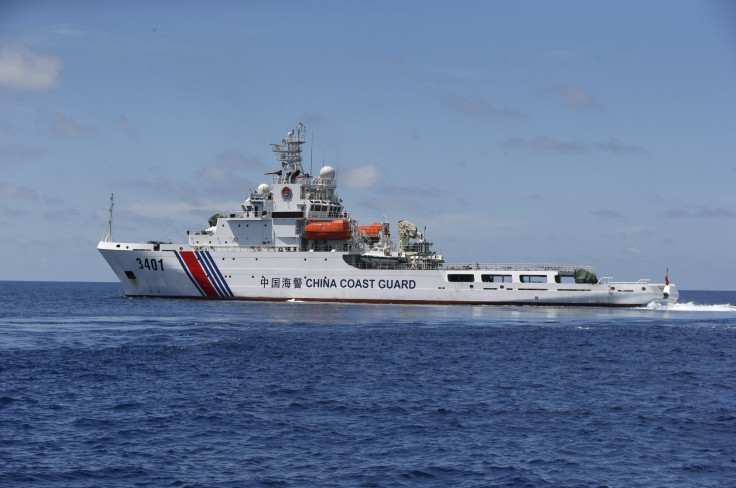South China Sea Dispute: China Blames ‘Militarization’ On Others, Reminds US Of Vietnam, Korea Wars

Chinese officials said Tuesday that their country is less responsible than others for the "militarization" of the South China Sea, and warned the U.S. could pay a price as heavy as it did for the Vietnam and Korea wars if it makes the wrong moves.
The statements come days after the U.S. said aircraft carrier USS John C. Stennis, three destroyers and a guided missile cruiser are conducting "routine" operations, including more than 200 flights, in the eastern part of the sea, drawing a protest from a Chinese government spokesman. The Stennis' commanding officer noted that there were many more Chinese ships in the sea than when he himself was last there in 2007.
"People talk a lot about militarization," state-run Xinhua News Agency quoted Chinese Foreign Minister Wang Yi as saying at a press conference on the sidelines of the National People's Congress in Beijing. "I think China cannot be accused of militarization. The label is more suited to some other countries."
Vietnam last month protested China's reported deployment of surface-to-air missiles on Woody Island in the Paracel island group. But from China's standpoint, militarization probably includes the U.S. giving the Philippines decommissioned vessels to beef up its weak navy and the Philippines last month signing a similar agreement with Japan. Last week, America said India will join the U.S. and Japan in naval exercises near the South China Sea this year. On Monday, media reports said a Japanese submarine will visit Philippine waters for the first time in 15 years next month.
Probably closest to home for China, the U.S. has twice since last year sent ships within the 12-mile radius China claims around two islands in the South China Sea, and says it will continue to do so, with the avowed purpose of keeping sea lanes open. Wang also took up the issue of freedom of navigation operations (FONOPs) on Tuesday, calling them a form of harassment.
Freedom of navigation is distinct from freedom of harassing. China won't allow any hassle in #SouthChinaSea: FM #NPC pic.twitter.com/Ri70hdZnEg
— People's Daily,China (@PDChina) March 8, 2016
Wang said there is freedom of navigation in the South China Sea, through which about half of the world's cargo and passenger ships pass and it is believed to hold vast supplies of natural gas.
"Based on the joint efforts of China and other regional countries, the South China Sea is currently one of the safest and freest shipping lanes in the world," Wang said, according to Reuters.
Tensions have intensified after the U.S. and other countries discovered China was expanding and even creating islands, and building docks, airstrips and other facilities on them, prompting U.S. President Barack Obama to call for an end to the land reclamation projects. Wang said building military facilities on the country's islands and reefs in the sea is for self-preservation and self-defense.
Earlier on Tuesday, the Straits Times quoted Cui Tiankai, China's ambassador to the U.S., as saying the U.S. could pay "a very heavy price" similar to what it experienced in the Vietnam and Korean wars.
"This is another example of a strategic misjudgment. I urge the U.S. not to repeat its mistakes in the past," Cui said, the Straits Times reported citing an interview published by the semi-official China News Service.
At the press conference, Wang repeatedly referred to the Association of Southeast Asian Nations as a "preferred partner" even though four of its members — the Philippines, Vietnam, Malaysia and Brunei — have claims on parts of the South China Sea, and even as the U.S. courts the same organization, most recently with a summit in California last month. Wang aired a proposal to set up "hotlines" with ASEAN for maritime emergencies, searches and rescues.
#China proposes to set up two hotlines with ASEAN for maritime emergency & joint maritime search, rescue:FM #NPCLive pic.twitter.com/arZSHZSxAg
— People's Daily,China (@PDChina) March 8, 2016
© Copyright IBTimes 2024. All rights reserved.





















